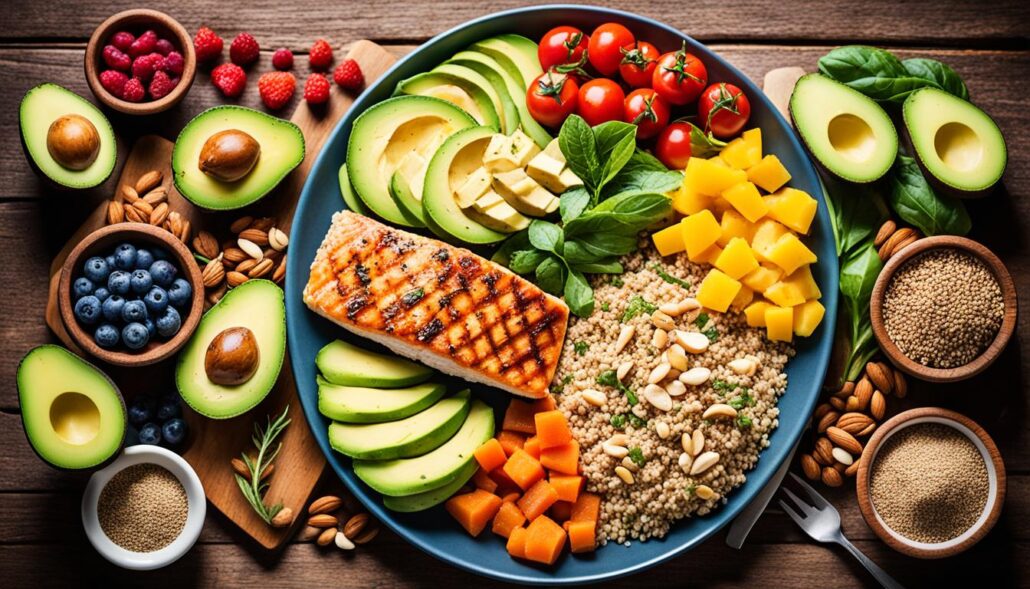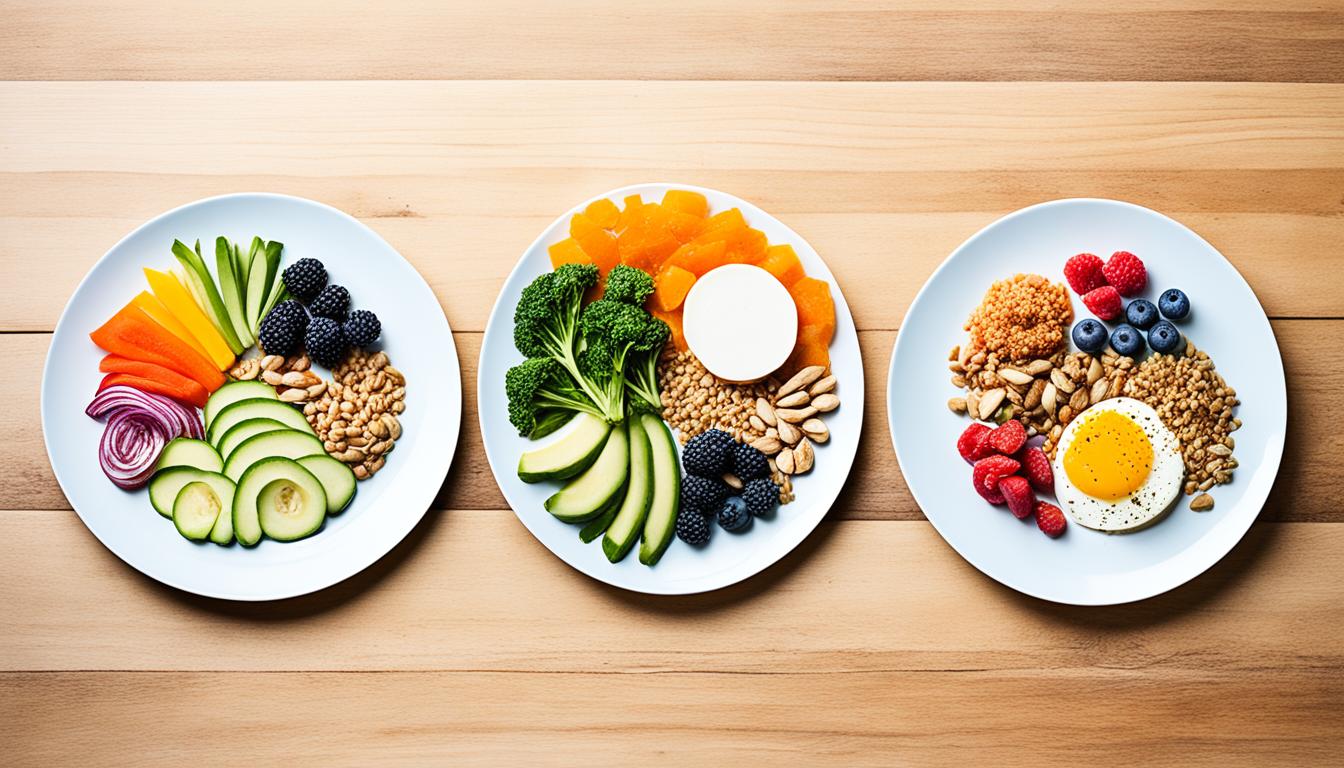Have you ever seen some people easily keep their weight off, while others can’t? The key is in sustainable weight loss strategies that become part of your life. But what are these strategies, and how do you use them for lasting success? Let’s dive in to find out and start your journey to a healthier, happier you.
Key Takeaways
- Sustainable weight loss is about making slow, lasting changes in your life.
- Eating well and staying active are key for keeping your weight in check.
- Setting goals you can reach helps you stay motivated and on track.
- Getting help from professionals can give you the support and accountability you need.
- Overcoming hurdles like plateaus and setbacks is key to keeping your weight off.
Understanding Sustainable Weight Loss
Long-term weight loss isn’t just about counting calories. It’s about learning the basics of weight management and taking a balanced approach. This approach helps your health and well-being. Let’s explore the main parts of sustainable weight loss.
Weight Loss Fundamentals
Weight loss is mainly about eating fewer calories than your body burns. But, it’s crucial to focus on the quality of those calories too. Eating nutrient-rich, whole foods helps your metabolism, gives you energy, and makes you feel full and satisfied.
The Importance of a Balanced Approach
Sustainable weight loss isn’t about quick fixes or extreme actions. It’s about a balanced way of living that feeds your body and supports your health. This means making slow, steady changes to your diet and activity levels. By doing this, you can tackle the real reasons behind weight gain and manage your weight for the long term.
| Sustainable Weight Loss Strategies | Unsustainable Weight Loss Tactics |
|---|---|
| Focused on balanced, nutrient-dense meals | Extreme calorie restriction or fad diets |
| Gradual, sustainable increases in physical activity | Excessive or punishing exercise regimes |
| Emphasis on long-term lifestyle changes | Quick-fix solutions with no long-term plan |
“Sustainable weight loss is not about quick fixes or extreme measures. It’s about adopting a balanced approach that nourishes your body and supports your overall well-being.”
Setting Realistic Weight Loss Goals
For lasting weight loss, set Realistic Weight Loss Goals that you can reach and keep. Experts say to lose 1 to 2 pounds each week. This safe and sustainable approach helps you keep the weight off.
Determining a Healthy Weight Range
To set Realistic Weight Loss Goals, figure out your Healthy Weight Range. Use the Body Mass Index (BMI) calculator to see where you stand. It shows your health status and a good weight range for your age, gender, and health.
The Power of Small, Achievable Goals
- Break your big weight loss goal into smaller, Achievable Weight Loss Goals.
- Small goals keep you motivated and help you make steady progress.
- Choose lifestyle changes you can keep up with, like eating well and staying active.
With Realistic Weight Loss Goals and a slow, steady plan, you’re more likely to hit and keep a healthy weight. It’s all about making changes that fit you and last over time.
“The secret to achieving and maintaining a healthy weight isn’t about quick fixes or crash diets – it’s about making sustainable lifestyle changes that you can stick to for the long haul.”
Keep going, be patient, and celebrate your wins. With the right mindset and steps, you can hit your Healthy Weight Range. Enjoy a healthier, happier life.
Creating a Personalized Weight Loss Plan
Losing weight and keeping it off needs a plan made just for you. This plan should fit your lifestyle, likes, and health needs. By making your diet and exercise plans your own, you’re more likely to stick with them. Adding foods and activities you love makes losing weight fun and lasting.
Tailoring Dietary and Exercise Recommendations
There’s no one-size-fits-all weight loss plan. The goal is to find what works best for you. Start by looking at what you eat and how active you are. Then, work with a health expert to create a plan that includes:
- Nutrient-rich, portion-sized meals you enjoy
- A mix of exercises you like doing
- Ways to overcome habits that lead to weight gain
Customizing your diet and exercise helps you make a plan that fits your life. This way, you can reach your weight loss goals and keep it off for good.
| Personalized Weight Loss Plan | Tailored Dietary and Exercise Recommendations |
|---|---|
| Focuses on your individual needs and preferences | Incorporates your favorite healthy foods and enjoyable physical activities |
| Increases the likelihood of sustained weight loss success | Addresses behavioral and lifestyle factors contributing to weight gain |
“The key to lasting weight loss is finding an approach that you can stick to, not just a quick fix. A personalized plan that fits your lifestyle and preferences is more likely to be successful in the long run.”
Effective Strategies for Losing Weight
Losing weight the right way means using a mix of diet, exercise, and lifestyle changes. By doing this, you can lose weight and keep it off for good.
Balanced Diet and Nutritional Planning
Eating a balanced diet is key to losing weight and staying healthy. Focus on foods like fruits, veggies, lean meats, whole grains, and healthy fats. Stay away from foods that are high in sugar and calories.
Regular Physical Activity
Exercise helps burn calories, boosts your metabolism, and makes you stronger. Add cardio, strength training, and flexibility exercises to your routine. Start slow and increase your efforts as you get fitter.
Behavioral Changes and Habit Formation
Changing how you think and act is also important for losing weight. Pay attention to what you eat, avoid eating too much, and find ways to handle stress that don’t involve food. Celebrate your small wins and be kind to yourself as you make these changes.
Using Balanced Diet for Weight Loss, Regular Exercise for Weight Loss, and Behavioral Changes for Weight Loss can help you reach and keep a healthy weight. This supports your overall health and well-being.

Sustainable Weight Loss Strategies
Long-term weight loss isn’t about quick fixes or fad diets. It’s about adopting Sustainable Weight Loss Strategies that you can keep up with. These strategies focus on lifestyle changes. They help you achieve Long-Term Weight Management and a healthier life.
Developing sustainable eating habits is key to weight loss. It means finding a balanced diet you can follow. Include a variety of whole, unprocessed foods in your meals. And don’t cut out foods you love, just eat them in moderation.
Regular exercise is also vital for Sustainable Weight Loss Strategies. Mix up your activities to include cardio, strength training, and flexibility exercises you enjoy. Start with small goals and slowly increase your workout intensity.
Getting enough sleep and managing stress well can help with weight loss too. Not sleeping well and high stress can mess with your hormones and metabolism. Make time for self-care to relax and recharge.
Having a supportive environment and people who back your Long-Term Weight Management goals is important. Get support from friends, family, or a weight loss group. They can keep you motivated and celebrate your wins.
Sustainable weight loss is not about quick fixes or drastic changes. It’s about making slow, lasting changes to your lifestyle. By using Sustainable Weight Loss Strategies, you can reach your weight loss goals and live a healthier, happier life.
The Best Way to Lose Weight and Keep It Off
Keeping weight off for the long term is tough, but it’s doable with the right habits and lifestyle changes. Developing Eating Habits and Lifestyle Changes for Weight Maintenance is key to Long-Term Weight Loss.
Sustainable Eating Habits
Eating nutrient-rich, whole foods is the base of lasting eating habits. Pay attention to when you feel hungry or full. Letting yourself enjoy treats in small amounts can keep you from feeling left out.
Lifestyle Changes for Weight Maintenance
It’s not just about what you eat. Adding more physical activity, getting enough sleep, and managing stress helps too. Having a supportive environment and checking in on your habits often can also help you stay on track.

“The secret to lasting weight loss is not just about the numbers on the scale, but about creating a sustainable lifestyle that nourishes your body and mind.”
Remember, losing weight is a journey. Keeping a healthy weight means finding a balance that works for you. By focusing on Sustainable Eating Habits and Lifestyle Changes for Weight Maintenance, you can keep losing weight and live a healthier, happier life.
Common Challenges in Weight Loss
Weight loss journeys come with hurdles. Two big ones are hitting weight loss plateaus and facing setbacks. Knowing how to deal with these can help you reach your weight loss goals.
Plateaus and How to Break Them
When your body adjusts to diet and exercise changes, you might hit a weight loss plateau. This is normal but can be tough. To get past it, look at your calories and exercise levels. Try doing more intense or longer workouts, or tweak your diet a bit.
Managing Setbacks
Setbacks, like missing workouts or eating something you shouldn’t, happen. But see them as chances to learn and improve. Plan how to handle them better next time and keep a positive outlook. Remember, losing weight is a long-term effort, and a few steps back don’t undo your progress.
“The secret of getting ahead is getting started. The secret of getting started is breaking your complex overwhelming tasks into small manageable tasks, and then starting on the first one.” – Mark Twain
Understanding and tackling challenges like weight loss plateaus and setbacks keeps you motivated. This way, you can stay on track to meet your sustainable weight loss goals.
The Role of Professional Support in Weight Loss
Trying to lose weight can be tough, but you don’t have to do it by yourself. Getting help from professionals can be key to reaching your goals and keeping a healthy weight.
When to Seek Medical Advice
Before starting a weight loss plan, talk to a healthcare professional, especially if you have health issues. They can give you advice on Professional Support for Weight Loss that fits your needs. They’ll watch how you’re doing and adjust their advice as needed.
- Talk about your weight loss goals and health worries with your doctor.
- Get tips on a diet and exercise plan that fits your life and likes.
- Find out about health conditions or medicines that could affect your Seeking Medical Advice for Weight Loss.
- Work with your doctor to set realistic weight loss goals and keep track of your progress.
Having a healthcare provider involved in your weight loss journey is smart. They make sure your plan is safe, works for you, and meets your needs. With their help, you can make smart choices and see lasting changes.
“Consulting a healthcare professional can make all the difference in your weight loss journey. Their expertise can help you develop a personalized plan that addresses your specific needs and sets you up for long-term success.”
Conclusion
Losing weight in a way that lasts means setting realistic goals and making lifestyle changes you can keep up with. It’s about eating right and staying active to create a calorie deficit. It also means looking at why you eat and how you feel to tackle those issues too.
Being patient and celebrating your small wins is key to Sustainable Weight Loss Conclusion and Long-Term Weight Loss Strategies. You need to be ready to change your plan if needed. This way, your weight loss journey stays positive and on track.
This journey is not just for now, but for the rest of your life. It’s about building habits that help you keep your weight off and enjoy better health. Keep going, stay motivated, and aim for the best version of yourself. The benefits will be huge.






